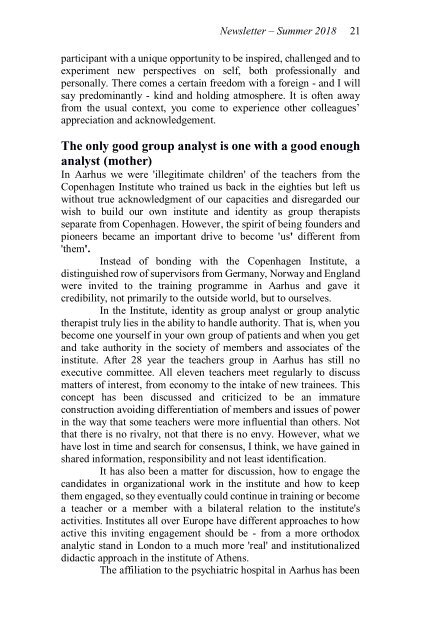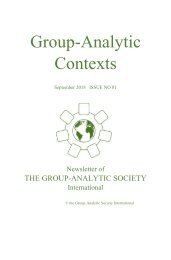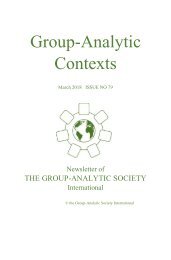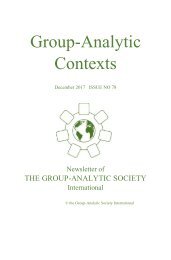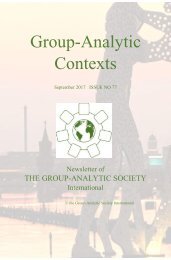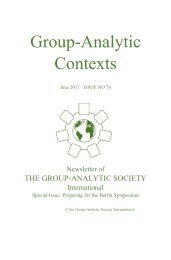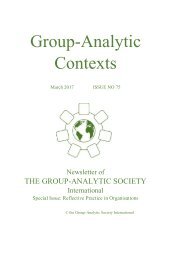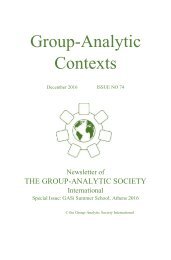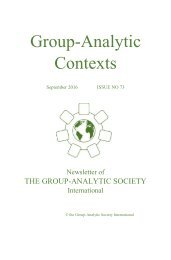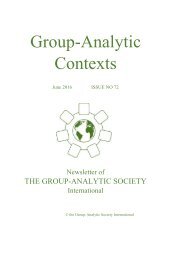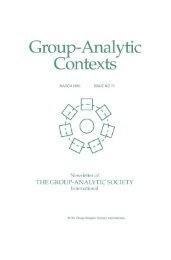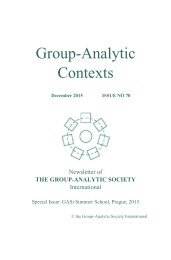Group-Analytic Contexts, Issue 80, June 2018
You also want an ePaper? Increase the reach of your titles
YUMPU automatically turns print PDFs into web optimized ePapers that Google loves.
Newsletter – Summer <strong>2018</strong> 21<br />
participant with a unique opportunity to be inspired, challenged and to<br />
experiment new perspectives on self, both professionally and<br />
personally. There comes a certain freedom with a foreign - and I will<br />
say predominantly - kind and holding atmosphere. It is often away<br />
from the usual context, you come to experience other colleagues’<br />
appreciation and acknowledgement.<br />
The only good group analyst is one with a good enough<br />
analyst (mother)<br />
In Aarhus we were 'illegitimate children' of the teachers from the<br />
Copenhagen Institute who trained us back in the eighties but left us<br />
without true acknowledgment of our capacities and disregarded our<br />
wish to build our own institute and identity as group therapists<br />
separate from Copenhagen. However, the spirit of being founders and<br />
pioneers became an important drive to become 'us' different from<br />
'them'.<br />
Instead of bonding with the Copenhagen Institute, a<br />
distinguished row of supervisors from Germany, Norway and England<br />
were invited to the training programme in Aarhus and gave it<br />
credibility, not primarily to the outside world, but to ourselves.<br />
In the Institute, identity as group analyst or group analytic<br />
therapist truly lies in the ability to handle authority. That is, when you<br />
become one yourself in your own group of patients and when you get<br />
and take authority in the society of members and associates of the<br />
institute. After 28 year the teachers group in Aarhus has still no<br />
executive committee. All eleven teachers meet regularly to discuss<br />
matters of interest, from economy to the intake of new trainees. This<br />
concept has been discussed and criticized to be an immature<br />
construction avoiding differentiation of members and issues of power<br />
in the way that some teachers were more influential than others. Not<br />
that there is no rivalry, not that there is no envy. However, what we<br />
have lost in time and search for consensus, I think, we have gained in<br />
shared information, responsibility and not least identification.<br />
It has also been a matter for discussion, how to engage the<br />
candidates in organizational work in the institute and how to keep<br />
them engaged, so they eventually could continue in training or become<br />
a teacher or a member with a bilateral relation to the institute's<br />
activities. Institutes all over Europe have different approaches to how<br />
active this inviting engagement should be - from a more orthodox<br />
analytic stand in London to a much more 'real' and institutionalized<br />
didactic approach in the institute of Athens.<br />
The affiliation to the psychiatric hospital in Aarhus has been


